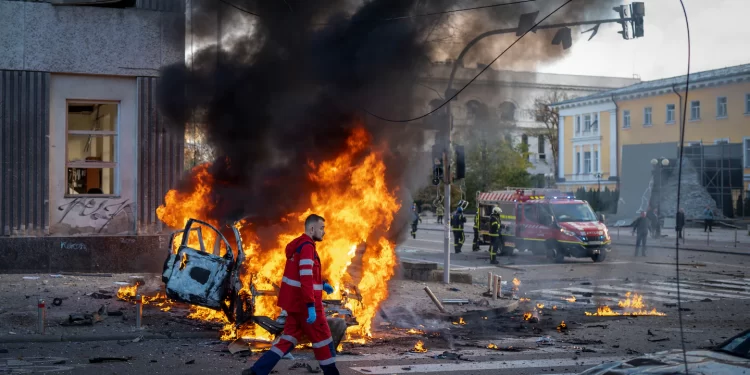Like these strikes, the 84 cruise missiles and 24 drones Mr. Putin launched — killing no less than 14 and injuring 97 extra — serve no actual army goal. His first goal was to instill concern in residents of inhabitants facilities removed from the entrance strains and cripple the electrical energy, water and different vital infrastructure on which they rely. His second aim was payback: revenge for the destruction Saturday of a key bridge connecting Russia with Crimea, possible carried out by Ukraine, and extra usually for Ukraine’s latest successes within the battle. Lastly, the implied menace of nuclear bombardment utilizing comparable supply autos can’t be ignored.
Arduous-liners in Russia, who’ve been urging Mr. Putin to focus on Ukraine’s civilian areas and infrastructure, pronounced themselves happy with this appalling escalation. They’re deceiving themselves: Russian artillery and plane have already sown huge loss of life and destruction on cities throughout Ukraine, reaching little extra, strategically, than to make Ukrainians who weathered these onslaughts extra dedicated to struggle. If historical past is any information, the newest assaults will additional stiffen Ukrainian resolve, simply because the V-2 marketing campaign 78 years in the past galvanized the British folks. Mr. Putin targets civilians at a time when his facet is floundering and dealing with defeat within the precise contest of armies, so add desperation to the listing of his motivations he shares with previous terror-bombers.
President Biden and different Western leaders promptly denounced this Russian atrocity. The subsequent step, diplomatically, is to forge forward with a United Nations decision condemning Russia’s purported annexation of 4 Ukrainian areas, which ought to come up for a vote within the U.N. Normal Meeting in coming days. Russia vetoed it within the U.N. Safety Council, with 10 members voting in favor — and 4 different international locations, together with China and India, abstaining. The previous of these two has tacitly backed Russia’s battle, albeit with out substantial direct arms cargo; the latter has pursued ostensible neutrality. After Russia’s assaults, nonetheless, each referred to as for de-escalation, a doable signal their positions have gotten decreasingly tenable. The Normal Meeting vote usefully places them, as soon as once more, on the spot.
In additional sensible army phrases, the Russian assault exhibits that Ukraine wants more and better air protection methods, along with those it already has — which it used to shoot down 43 of the missiles Moscow launched. The USA says supply of its Nationwide Superior Floor-to-Air Missile System, or NASAMS, ought to be full inside “a number of weeks.” German methods are additionally en route. France, in the meantime, has hesitated, reportedly due to components shortages. Regardless of the impediment, Paris wants to beat it.
Enabling Ukraine to restrict the harm from Mr. Putin’s aerial terrorism will assist make sure that, like similar campaigns in the past, this one proves an train in strategic futility.











